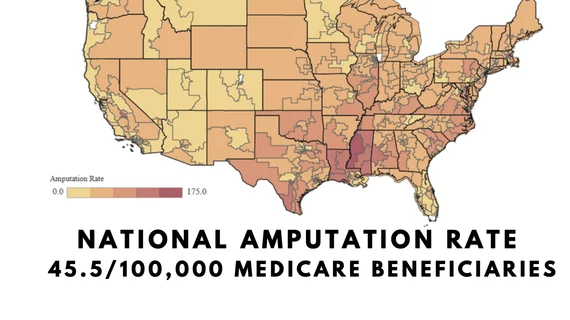PAD is a public health crisis say cardiovascular societies
September is peripheral artery disease (PAD) awareness month, and a group of cardiovascular medical societies, the PAD Pulse Alliance, is using it to promote awareness for patients and referring physicians to act against the debilitating disease.
PAD affects more than 10 million Americans and is a factor in 400 amputations each day, making it the largest cause of nontraumatic amputations in the United States. PAD statistics also highlight major health disparities. Among Black and Hispanic adults, the alliance said nearly 80% report never having a doctor or healthcare provider discuss PAD with them.
"PAD silently amputates, affecting millions of Americans, many in underrepresented communities, who unfortunately are often unaware of the risks, symptoms, or consequences of this disease until it’s too late," said James B. Hermiller, MD, MSCAI, president of the Society for Cardiovascular Angiography and Interventions (SCAI), a founding member of the PAD Pulse Alliance, said in a statement. "Now is the time to make a difference. We hope getting a ‘pulse on PAD’ can save lives, limbs, and livelihoods. We encourage you to share the Patient Toolkit with your friends and family who are at risk of PAD."
The PAD Pulse Alliance also includes the Association of Black Cardiologists (ABC), the Society of Interventional Radiology (SIR) and the Society for Vascular Surgery (SVS). Launched earlier in 2024, the Get a Pulse on PAD campaign said it has reached millions through social media, digital influencers, and media outreach to spread the word and engage with the public to raise awareness.
“PAD is not merely a cardiovascular issue, it is a public health crisis that quietly drives unnecessary amputations, causes disabling generational impairment, and claims lives—especially among Black and Hispanic populations. We are dedicated to closing the gaps in awareness and care, ensuring that everyone, regardless of race or background, is equipped with the knowledge and resources to safeguard their health. This month, and every month, we must elevate the dialogue about PAD, empower our communities with essential information, and advocate for equitable access to life-saving care,” explained Foluso Fakorede, MD, CEO of Cardiovascular Solutions of Central Mississippi, and co-chair of the Association of Black Cardiologists PAD Initiative, in a statement.
Cardiovascular Business has covered PAD and this campaign with a series of video interviews in 2024:
• Health disparities are causing serious harm, leading to 400 amputations per day - Interview with Foluso Fakorede, MD
• Peripheral artery disease is out of control in many rural, low income communities — Interview with Kumar Madassery, MD
• Miami cardiologist works to address PAD health disparities in low-income neighborhoods - Interview with Pedro Martinez-Clark, MD
• Death rate from critical limb ischemia is high in rural Oklahoma - Interview with Jim Melton, DO
• Cardiologist details the many health disparities he encounters in rural Mississippi - Interview with Foluso Fakorede, MD
• Addressing high PAD and CLI rates in Latin and Haitian communities of Miami - Interview with Pedro Martinez-Clark, MD
• Mobile cardiology clinic reaches rural, Native American populations in Oklahoma - Interview with Jim Melton, DO
• Cardiologist moves to Mississippi to fight back against PAD and limit amputations - Interview with Foluso Fakorede, MD
• Interventional techniques can help limit amputations among CLI patients — Interview with Kumar Madassery, MD
For more information, visit www.PADPulse.org, or follow the campaign on social media using #PulseonPAD.

